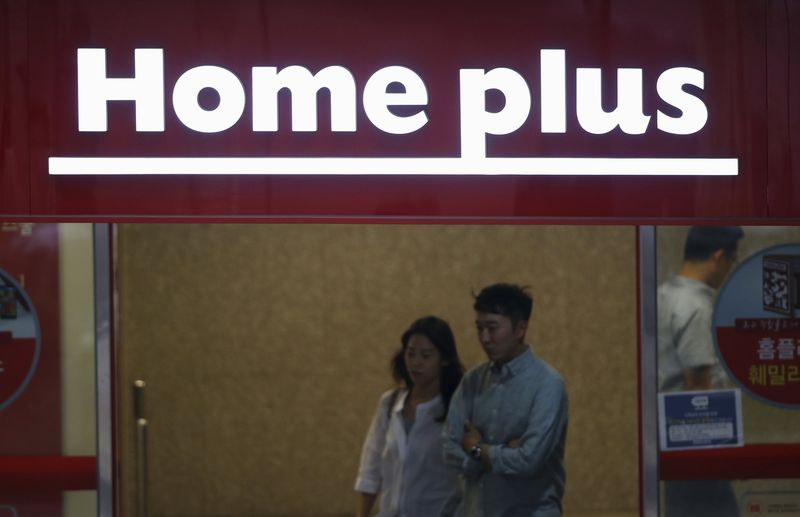By James Davey and Joyce Lee
LONDON/SEOUL (Reuters) - Tesco (L:TSCO) is selling its South Korean arm to a group led by private equity firm MBK Partners for $6.1 billion (4 billion pounds), it said on Monday, as the British supermarket retreats from foreign markets to focus on reviving its troubled domestic business.
The sale of Homeplus, its largest overseas asset, represents the first large divestment by Tesco boss Dave Lewis, who wants to slash debt and rid the firm of its junk credit rating after its profits were battered by market share losses to discounters Aldi and Lidl in Britain and by an accounting scandal.
It follows Tesco's costly exits from Japan and the United States, as well as a reduction of its exposure to China, under previous management and highlights the difficulty Western retailers have had away from their home markets.
Tesco has agreed to sell Homeplus to investors led by MBK and including the Canada Pension Plan Investment Board, Public Sector Pension Investment Board and Temasek Holdings (TEM.UL).
"This sale realises material value for shareholders and allows us to make significant progress on our strategic priority of protecting and strengthening our balance sheet," said Lewis, a former Unilever (L:ULVR) executive who was hired last September to lead Tesco's turnaround.
Under the terms of the largest-ever private equity transaction in Asia, Tesco will receive 4 billion pounds ($6.1 billion) in cash. After adjustments for tax and transaction costs, the net cash proceeds, to be received in a combination of U.S. dollars and Korean won, will be around 3.35 billion pounds.
Tesco said the Homeplus disposal would reduce its total indebtedness, which stood at 21.7 billion pounds as of end-February 2015, by 4.225 billion pounds.
However, the deal will remove a business that contributed around 150 million pounds to annual earnings.
"(The) price looks OK," said one major Tesco shareholder.
"I suspect that despite the earnings dilution the market will take a positive view of the deal as it strengthens the balance sheet."
INVESTMENT GRADE
Shares in Tesco, down 19 percent over the last year, slipped 0.3 percent by 0951 GMT after an initial rise of up to 2 percent.
Tesco will use the proceeds to redeem upcoming bond and commercial paper maturities over the next 18 months. It will also consider the purchase of some UK leasehold stores.
The sale comes after the 96-year-old group announced in April one of the biggest losses in British corporate history, hit by a 7 billion pounds write-down.
Bernstein analyst Bruno Monteyne, a former senior Tesco supply chain executive, said the deal should allay fears the firm will need to ask shareholders for cash to secure its balance sheet.
He said it would only have a small impact on the net debt to core earnings ratio, moving it from 6.2 times to 6.0 times for the 2015-16 financial year.
But he said it would enable Tesco to get below the 4.5 times ratio needed by ratings agency Moody's for an investment grade credit rating in 2017-18.
Completion of the disposal, which requires the approval of Tesco shareholders and regulators, is expected during the fourth quarter of 2015.
Lewis will now turn his attention to the sale of Tesco's customer data business Dunnhumby, which he put on the block in January.
Reuters had previously reported that MBK was the preferred bidder for Homeplus, which has 140 hypermarkets, 375 supermarkets and 327 convenience stores.
The MBK consortium said it planned to invest 1 trillion Korean won ($831 million) in Homeplus over the next two years to boost its competitiveness.
HSBC Bank (L:HSBA) acted as Tesco's lead financial adviser and Barclays (LONDON:BARC) Bank as financial adviser and sponsor. Deutsche (DE:DBKGn) and CitiGroup (N:C) advised MBK.
